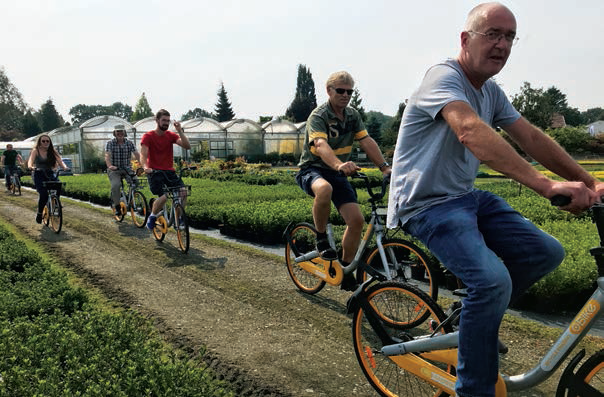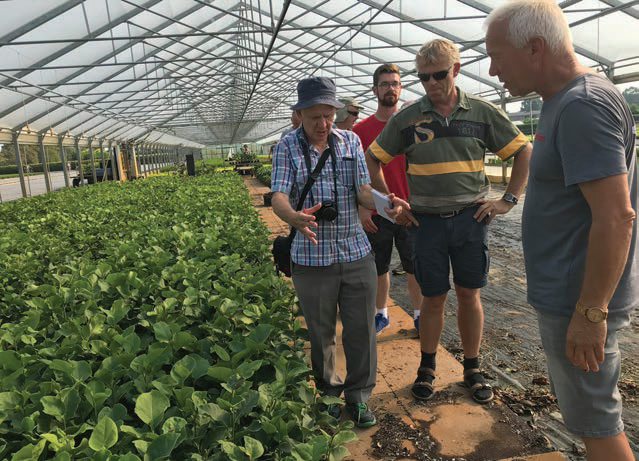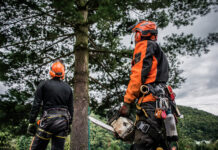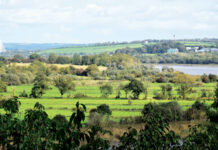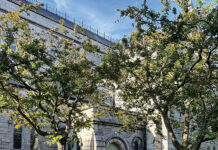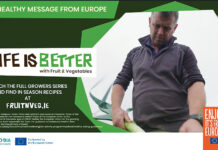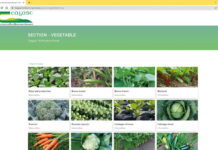Teagasc Nursery Stock Advisor, Dónall Flanagan shares some very useful insights from a recent study tour covering German Nurseries and the Baumschule Technik Trade show
Lorenz Von Erhen (LVE) has six sites covering an area of over 400 hectares. They produce high quality extra heavy standard trees and uncommon mature specimens. The machinery is of a size to match this and likely some of the biggest tree lifting systems available. The company takes on apprentices regularly and hosts work placement students from across the world in their attractive on-site accommodation. Thomas Dieckman production manager said they welcome requests for placements and he takes personal responsibility for students to experience a range of skills. Due to the size of the production area, LVE have numerous rights of way on their sites. They have helped to maintain local goodwill by planting blocks of wildflower and pollinator mixes along these paths and near villages.
Marcus Lehmann is the third generation in the family nursery Baumschule Lehman. Marcus explained how the nursery has developed some branded concepts for the business which he hopes sets him apart from others in the garden centre market. Much of the branding has focused on child-friendly fruit plants and gardening. The business has a newly established webshop for retail customers. Neils Reinke is another 3rd generation nurseryman. Reinke nursery produces a wide selection of plants including native plants used in land restoration schemes. These are produced in pots due to the season being longer than for bare roots.


Kordes Young Plants’ reputation for producing quality plants is widely renowned. The business has seen its focus move towards breeding and higher quality plants and away from a wide range of common shrubs. Its main partners are the US nurseries, Bailey and Spring Meadow. Attention to detail was seen at every point in the production cycle and on the nursery, not least in customer care and support.
Hachmann Rhododendron are specialist rhododendron and conifer producers. They have innovated where gaps were seen e.g. over a few years breeding new lines of Potentilla with much better flowering longevity. They have been able to take advantage of plant health restrictions in Scandinavia by collaborating with a specialist company in the Netherlands that washes plant roots, free of growing media before shipment. The cost has been a barrier to other volume, mid-quality growers and in some way helped protect this market. The specialisation of nurseries was demonstrated again in the adjacent nursery. Established in 1912 Spilkers young plant nursery, recently began to focus production of specialist stock of Magnolia. High demand and value of the plants has allowed owners, Udo and Thiemo Haltermann, to reinvest their cash flow in new land and superior growing structures. These plants now ship across Europe and bare root to Asia and North America after root washing in the Netherlands as per the Rhododendrons
Clasen nursery delivers a narrow but specialised range of containerised fruit trees, conifer and heavy standard trees. This was the only nursery visited not using bark mulch for weed suppression, instead of relying on trade secret, traditional herbicides. Each plant type was strictly scheduled, fitting into a precise annual format. The organised nature of the site and the incredible level of uniformity for each product line was striking; thus easing the bottleneck at dispatch and ensured customer satisfaction.
In each location, it was apparent that producing quality products and long term value for their customers was paramount.
FEATURES OF MITTLESTAND COMPANIES
1. Long-term value as central goal
2. Family owned and cultural focus
3. Innovation and quality products– allied to funding and research centres
4. Decisions focused on long term results e.g. investments in the workforce
5. Competitive clusters e.g. Pinneberg district
6. Social responsibility – to develop a thriving business is to develop an economy and thus society
7. Workforce training using a dual system of schools and workplace
BAUMSCHULE TECHNIK TRADE SHOW – AUTOMATION AND LABOUR
The open-air trade show attracts businesses and families to see the latest innovations and introductions of new or emerging technologies. About 8,000 people attend this year from 24 countries. The venue is the nursery research centre in Schleswig Holstein LKSH. It had open fields planted with tree and field nursery stock available to see machinery being demonstrated. As it’s only held once every three to eight years it’s useful in helping growers to shape their development plans in the medium term. Hundreds of the leading companies for field or container production were present including; Egedal, SMZ, Damcon, Javo, Mayer etc. Common themes of the machine innovations were the conservation of resources (soil, water, energy) and labour.
Self-propelled machinery with self-guided steering was a major topic of the event. Most machines demonstrated how driving could be automated to reduce labour demand. The Andela solar weeder is powered by sunlight with PV panels on the canopy over the weeding rig. It travels at up to 1km per hour and costs c.€7000 for a self-steering two-person rig. FMR Maskiner working with Agrointelli have developed a self-propelled diesel tool carrier which was capable of a range of low traction work e.g. seeding, spraying, weeding, etc. The twin diesel engine “robot” costs in the region of €100,000 and requires laser guidance to work independently. German compact tractor manufacturer Agria displayed the 9600, zero-turn track mulcher/ mower that is completely operated by remote control and is ideal for very steep banks. Robot Makers demonstrated the RowCropPilot in use in tree lines. This machine is autonomously guided by lasers and was set on a tracked machine with a Damcon ULV sprayer and mower.
Autonomous robots for moving plants and spacing have been seen in the sector for a year or two. There has been a slow evolution of the robots over this time, from moving one plant at a time from A to B within a set area (Harvest automation), to collecting and moving five plants in a wider workspace by the Trooper robot (Instar Robotics). Laser is taking over from GPS in guiding the robots due to its increased reliability in glasshouses. The labor-saving potential of the robots is obvious, having a system that works overnight spacing or assembling orders that come in online, etc. Pricing would suggest it would take three years to reach the break-even point for either of these machines.
Technical innovations were seen in many field production activities for example weed control using electrocution, steaming, hot water and high-pressure cold water. Technical refinements were seen across the board from soil sterilization systems to precision inter-row weeders. The show demonstrated the nursery stock sectors push towards reducing labour, efficient use of resources and minimising environmental impact. ✽
  Dónall Flanagan – Teagasc, Ashtown Food Research Centre |



